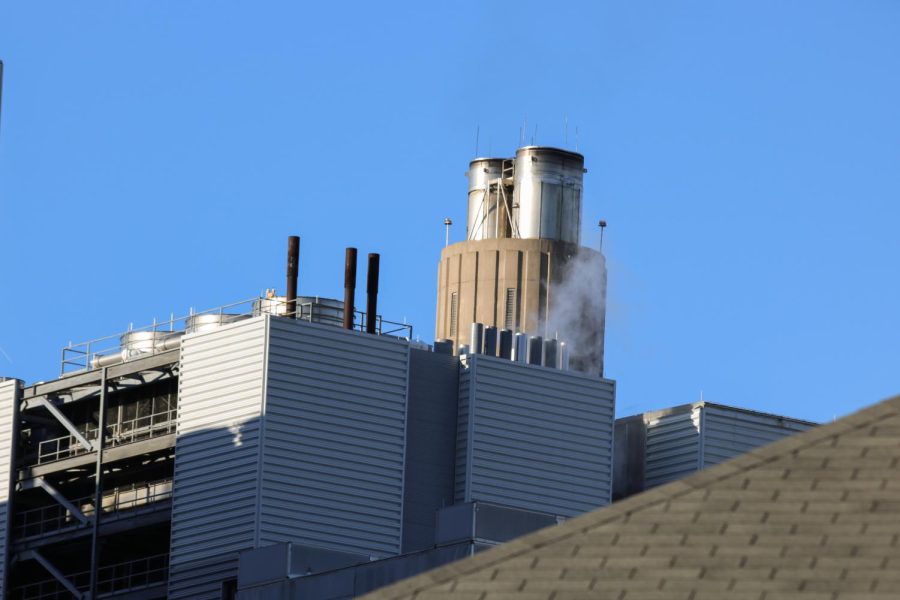Op-ed: Biden needs to continue to keep campaign promises, address climate crisis
President Joe Biden must do more to help combat climate change.
November 12, 2021
In late October, the United Nations officially began its long overdue two-week conference on climate change. 197 parties, including the United States, were in attendance at the summit in Glasgow, Scotland. Although President Joe Biden is participating in this international forum, his recent actions on climate change prove more performative than transformative.
In a speech to fellow leaders last Monday, President Joe Biden talked the talk, referring to climate change as an “existential threat to human existence as we know it.” But can he walk the walk?
The summit comes following a release from the Intergovernmental Panel on Climate Change, or IPCC, saying that the planet has warmed by 1.1 degrees Celsius since 1850-1900, primarily due to carbon emissions that have been released into the atmosphere from human activity.
The Biden-Harris presidential campaign page promised to “rally the rest of the world to meet the threat of climate change” through a variety of measures, from new preventative legislation to distribution of resources in the communities most impacted by climate change. But Biden’s main approach to achieving climate justice was rejoining the Paris Agreement.
In February, the United States did just that. Just hours after his inauguration, Biden signed an executive order rejoining the Paris Agreement.
Like many other Americans, I hoped that this step so early on would represent a progressive future for Biden’s presidency and his climate policies. Disappointingly, though not surprisingly, this hope has gone unfulfilled. Americans voiced their disappointment with the lack of progress the Biden administration was making on addressing climate change with climate justice protests breaking out this fall in the nation’s capital.
In an interview with AP News, the co-director of climate justice organization Zero Hour called current events a “betrayal from the White House.” And frankly, I agree.
Not only is the climate crisis an issue of rising temperatures and sea levels, but also one of human rights. Fossil fuel extraction has detrimental impacts on many Americans, especially Native American communities across the country.
It is time for us to consider climate change as an intersectional issue, one that disproportionately impacts marginalized communities worldwide.
Jennifer Psaki, White House press secretary, urges climate activists to investigate the plans Biden already has in place to address the climate crisis.
But two lingering demands of Biden were expressed by activists across the country: declaration of a national climate emergency and rejection of dependency on fossil fuels.
Biden’s most recent climate-related Build Back Better bill, which promised to “phase out fossil fuels from America’s electricity supply,” is still being negotiated after its original budget has been reduced by almost half.
So other than attempting to convince his colleagues to pass this legislation, what else can Biden really do?
He can call the climate crisis what it is: an emergency. Biden’s hesitancy to declare a national climate emergency has been criticized by activists, politicians and environmental groups alike. In a collaborative letter published in December 2020, more than 380 climate and environmental groups called on Biden to make this declaration before he had even taken office.
This criticism is warranted. If the president were to honor the wishes of these advocacy groups, he would be joining 2,037 jurisdictions in 36 countries that have declared a climate emergency; these governments oversee about 1 billion citizens cumulatively. This lack of action from Biden as an international leader is ridiculous, especially as the United States stands at number two in international carbon emissions.
If Biden were to take this action, he would gain access to provisions reserved for presidents leading the country though a time of extreme strife. Other national emergencies in the past included pandemics and wars, matters of national security. Elevating climate change to this level of importance would force Americans to acknowledge this issue fervently.
The term “national emergency” could also unite both sides of the aisle and force timely, concerted action against climate change. As of right now, the climate crisis is a partisan issue, rather than one that is feared and agreed upon by members of Congress.
Local leaders here in Massachusetts argued this view already. Sen. Elizabeth Warren already acknowledged her position via Twitter, saying, “By officially declaring it a national emergency, the Biden-Harris administration can unlock more tools and resources to tackle this crisis head-on.” Sen. Ed Markey also supported this initiative through a letter addressed to the Biden administration, co-signed by Sen. Bernie Sanders and Rep. Veronica Escobar.
But this encouragement from fellow politicians clearly has not been enough.
As college students, we are able to apply pressure on Biden. An easy first step is to sign petitions, sponsored by many members of the U.S. Congress, including Rep. Jim McGovern of Massachusetts; this will let Biden know that classifying the climate crisis as a national emergency is one of your main concerns as a citizen and voter.
Encourage your family members and friends to do the same. A recent poll by Vice found that 60% of people in the United States “almost never” discuss climate change with those around them. Demand from voters of all ages, races, political beliefs and locations is the only way to force Biden’s recognition of the issue for what it is.
We have a responsibility to let Biden know that labeling the climate crisis as a national emergency is not just symbolic; it allows for true change that could make a world of a difference.
Greta Magendantz is a first-year journalism and political science combined major. She can be reached at [email protected].


















